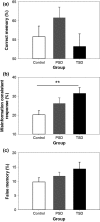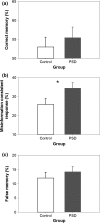Sleep deprivation increases formation of false memory
- PMID: 27381857
- PMCID: PMC5324644
- DOI: 10.1111/jsr.12436
Sleep deprivation increases formation of false memory
Abstract
Retrieving false information can have serious consequences. Sleep is important for memory, but voluntary sleep curtailment is becoming more rampant. Here, the misinformation paradigm was used to investigate false memory formation after 1 night of total sleep deprivation in healthy young adults (N = 58, mean age ± SD = 22.10 ± 1.60 years; 29 males), and 7 nights of partial sleep deprivation (5 h sleep opportunity) in these young adults and healthy adolescents (N = 54, mean age ± SD = 16.67 ± 1.03 years; 25 males). In both age groups, sleep-deprived individuals were more likely than well-rested persons to incorporate misleading post-event information into their responses during memory retrieval (P < 0.050). These findings reiterate the importance of adequate sleep in optimal cognitive functioning, reveal the vulnerability of adolescents' memory during sleep curtailment, and suggest the need to assess eyewitnesses' sleep history after encountering misleading information.
Keywords: adolescents; adults; cognitive function; false memory; memory formation; sleep deprivation.
© 2016 The Authors. Journal of Sleep Research published by John Wiley & Sons Ltd on behalf of European Sleep Research Society.
Figures




References
-
- Akerstedt, T. and Gillberg, M. Subjective and objective sleepiness in the active individual. Int. J. Neurosci., 1990, 52: 29–37. - PubMed
-
- Carskadon, M. A. , Harvey, K. and Dement, W. C. Acute restriction of nocturnal sleep in children. Percept. Mot. Skills, 1981, 53: 103–112.
-
- Cohen, J. Statistical Power Analysis for the Behavioral Sciences, 2nd edn Lawrence Erlbaum Associates, Hillsdale, NJ, 1988.
-
- Diekelmann, S. and Born, J. The memory function of sleep. Nat. Rev. Neurosci., 2010, 11: 114–126. - PubMed
Publication types
MeSH terms
LinkOut - more resources
Full Text Sources
Other Literature Sources

